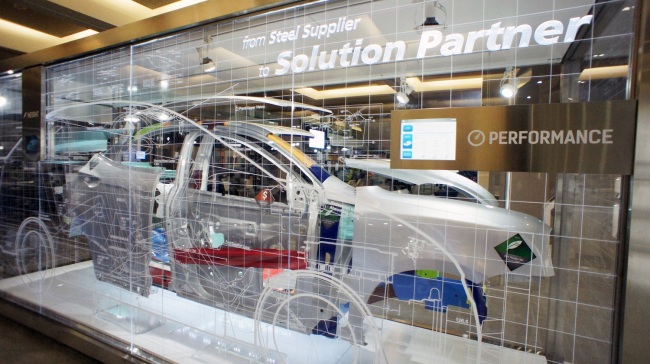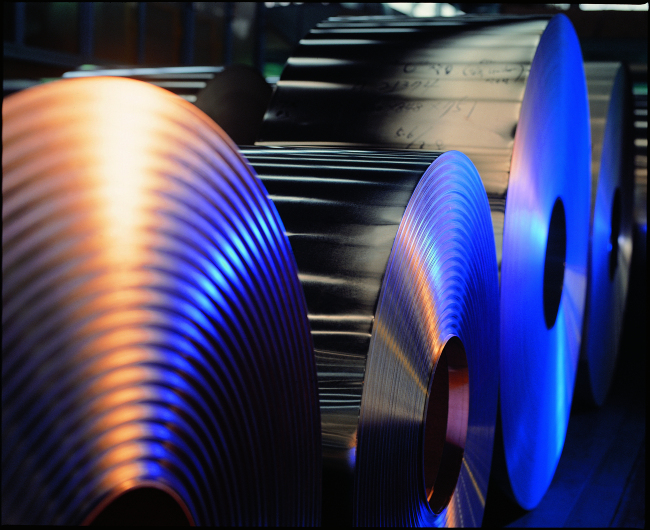Lighter but stronger: Posco develops giga steel for future cars
By Korea HeraldPublished : March 28, 2017 - 16:52
With carmakers shifting their focus from gasoline-based vehicles to electricity-powered ones under high pressure to curb carbon emissions, the industry has been experimenting with new materials to replace heavy steel.
From carbon fiber reinforced polymer to aluminum, carmakers are still contemplating what to use to make environment-friendly vehicles energy efficient as they come with heavier batteries and electric motors.
Expressing confidence, South Korean steel giant Posco, has been actively introducing its latest steel product, giga steel, which is lighter but stronger than conventional ones.
From carbon fiber reinforced polymer to aluminum, carmakers are still contemplating what to use to make environment-friendly vehicles energy efficient as they come with heavier batteries and electric motors.
Expressing confidence, South Korean steel giant Posco, has been actively introducing its latest steel product, giga steel, which is lighter but stronger than conventional ones.

“Aluminum, typically one-third of the weight, has been often referred to as new automotive steel materials. But not only is steel competitive (in terms of) price, it can be as light as (aluminum) if using giga-level (steel) that is three times stronger in strength but lighter (than regular steel),” said Posco Chairman Kwon Oh-joon, in a recent interview.
The company plans to expand global marketing of giga steel, which refers to ultrahigh-tensile strength steel rated at more than 1 gigapascal. It is strong enough to endure pressure of 100 kilograms per square millimeter.
Last year, the South Korean steelmaker sold 9 million tons of automotive steel, accounting for about 10 percent of the market. It plans to expand sales of automotive steel to 10 million tons after 2018.
Posco has produced 17 giga steel products for commercial use.
Only 20 of some 800 steelmakers around the world are able to produce automotive steel as it requires high technical skills.
Posco is the only steelmaker in the world that has succeeded in commercializing twining-induced plasticity steel, dubbed as “dream steel” for its high strength and formality. TWIP steel, a kind of giga steel, is mainly used for the front and back bumpers of cars and it can withstand up to 100 kilograms per square millimeter of pressure, according to the company. It also has up to three times higher formality.
Posco also has another exclusive technique in producing hot press forming steel rated at 2 gigapascal. HPF steel is another kind of giga steel that endures up to 150 kilograms per square millimeter and has high formality under high temperatures. It is mainly used for the center pillars of vehicles, designed to protect passengers from external shock, particularly in case of a broadside collision or rollover accidents. HPF was first adopted by French carmaker Renault for its concept car Eolab introduced during the 2014 Paris Motor Show.
Posco entered the automotive market in 1973 by selling hot rolled coil to local carmakers including Hyundai Motor and now-defunct Daewoo Motor. It made its global market debut in the mid-1990s by signing long-term deals with US and Japanese carmakers. Currently, the steelmaker provides products to 15 global top carmakers.

Positioning itself as a solution provider for carmakers, the Pohang-based steel giant has been seeking partnership with local carmakers and top tier auto parts makers.
Business partnership between Posco and SsangYong Motor is the latest project.
Posco’s giga steel was applied in SsangYong’s latest sport utility vehicle G4 Rexton to be unveiled at the Seoul Motor Show on Friday, with commercial production set to start in May. Posco has also held a joint exhibition with Renault Samsung and GM Korea, the company said.
“We plan to increase global sales of automotive steel by expanding production facilities overseas and seeking technological advancement,” an official said in a statement.
“We also hope to sell the latest steel technology exclusively developed for cars to top-class carmakers and will better focus on developing steels that are lighter and safer.”
By Cho Chung-un (christory@heraldcorp.com)
-
Articles by Korea Herald








![[Hello India] Hyundai Motor vows to boost 'clean mobility' in India](http://res.heraldm.com/phpwas/restmb_idxmake.php?idx=644&simg=/content/image/2024/04/25/20240425050672_0.jpg&u=)










